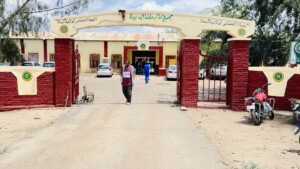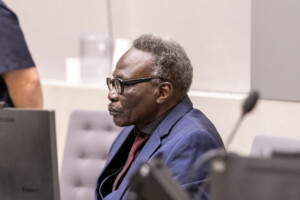June 3 Massacre investigation committee forced to stop work after office seizure
The national committee set up to investigate the violations that occurred during the violent dispersal of the sit-in in front of the army command on June 3, 2019, announced that it has had to stop its activities after security forces seized the committee’s main office at the end of last week.
 Banner at a 2019 vigil in Khartoum North in solidarity with people who went missing during the June 3 Massacre (RD)
Banner at a 2019 vigil in Khartoum North in solidarity with people who went missing during the June 3 Massacre (RD)
The national committee set up to investigate the violations that occurred during the violent dispersal of the sit-in in front of the army command on June 3, 2019, announced that it has had to stop its activities after security forces seized the committee’s main office at the end of last week.
The committee is headed by prominent lawyer and human rights defender Nabil Adib.
In an interview with Radio Dabanga’s Sudan Today programme, Nabil Adib explained that security forces ordered the evacuation of the buildings occupied by the committee's own guarding staff and handed them over to authorities. They prevented the committee's employees from entering the premises and taking any equipment belonging to the committee.
Adib said that the committee’s work should be resumed and that the office building should be evacuated of ‘those who stormed it’.
He said that it is important to make sure that the committee's documents are not tampered with and that a security check should be conducted at the building to ensure that there are no equipment items or tools that could be used to reveal secret information included in the investigation.

June 3 Massacre
On June 3, 2019, two days before the end of Ramadan, the large sit-in in front of the army command, was broken up with excessive violence. More than 186 protesters were reportedly killed. The bodies of 40 of them were found floating in the Nile. More than 700 others sustained injuries, and at least 100 people went missing in the June 3/Ramadan 29 massacre.
The sit-in was the result of the military coup. Since December 2018, large protests were organised to pressure the then ruling Omar Al Bashir to step down. In April, the dictator was deposed in a military coup. However, protesters continued to occupy the space in front of the Ministry of Defence to demand the military to cede power to a civilian government.
Two months later, on June 3/Ramadan 29, the people at the sit-in were attacked by government forces.
Upon request of former PM Hamdok, an independent national commission of inquiry into the June 3 massacre was formed in September 2019, headed by Nabil Adib. The commission began collecting testimonies, photos, and video recordings of more than 3,000 witnesses and started in-person questioning of the military members of the Sovereignty Council last year.
During last year’s commemorations, Hamdok admitted that “complicated ties” with security forces “has sometimes slowed down justice and delayed the submission of information” required by the committee.
The information gathered by the committee shines a light on the role of the military and security forces, who took power on the October 25 military coup, in the massacre.
“The result could lead to a coup d’état or to mass unrest in the streets,” Adib said in an interview on May 4, 2021.











 and then
and then